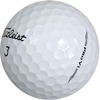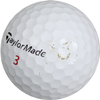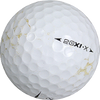Okay class, let's review what we've covered so far. In Part One we talked about the first golf balls. The ones made of wood, then the feather-stuffed leather ones (featheries). In Part Two we covered the "guttie," the first actually round ball made from the sap of the Sapodilla tree. Also the ball that made golf cheap enough for the regular Joe. Today we're going to cover the next major advancement in golf ball technology. The "Bounding Billy."
Here's the story. Sometime in the 1890s some really bored scientist* at BF Goodrich wound up a bunch of rubber bands into a tight ball and tried bouncing it. He found that it held a lot of "potential energy" (that means “bouncy” in science talk). So, they wrapped some rubber threads around a solid rubber core, skinned it with gutta percha sap, and BANG! Something resembling the modern ball was invented, bringing control, feel and distance to a new level.
This new ball was officially called the “Haskell” after the wealthy golfer who helped introduce it. But it was nicknamed the “Bounding Billy” for its big bounce and roll. Some people thought these balls just went too damn far (literally), but after they were used with immense success in the British and US Opens they became the new standard. And golf course holes started to get longer.

Of course, people tried to improve on the Haskell too. For instance, they experimented with all kinds of different core materials. Renewable cork. Tasty honey. Yucky castor oil. Wine. Environmentally-friendly mercury. Unbelievably, radium! One version even used compressed air. But these tended to explode making them the perfect gift for the guy you only invite to complete your foursome. What happened after this you ask? You'll just have to wait for Part Four - or skip ahead and read the entire history here.
*Disclaimer: We don't know for sure if boredom was a factor in the creation of the Haskell, but winding rubber bands into a ball during office hours? C'mon!




